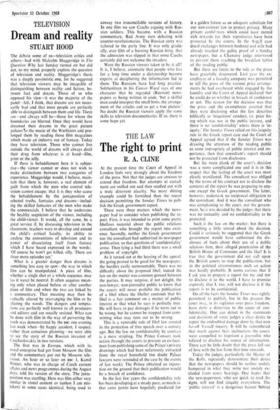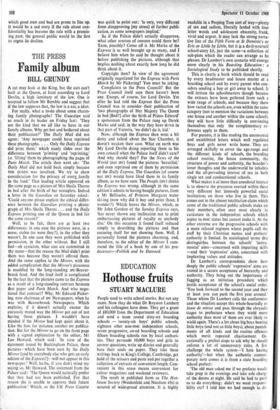The right to print
THE LA WV
R. A. CLINE
At the present time the Court of Appeal in London feels very strongly about the freedom of the press. Not that the judges are anxious to extend that freedom. But attempts at curtail- ment are sniffed out and then snuffed out with
a truly deterrent alacrity. No more shining example could be furnished than the recent decision permitting the Sunday Times to pub- lish the Greek government report.
There were three matters which the news- paper had to consider when publishing the re- port. First, it was intended to print some pretty libellous material about the public relations consultant who brought the report into exist- ence. Secondly, neither the Greek government nor the consultant had authorised its newspaper publication, so that questions of 'confidentiality' arose. Then lying a bad third there was a small problem of copyright.
As it turned out at the hearing of the appeal. the going proved to be good for the newspaper, the hurdles easily surmountable. There was no difficulty about the proposed libel; indeed the law on the matter was common ground between the parties. It may surprise, if not delight, the non-lawyer, non-journalist public to know that the courts will never prohibit the publication of a libel where the libeller contends that his libel is a fair comment on a matter of public interest or that what he says is perfectly true. He will have to pay damages if he turns out to be wrong, but he cannot be stopped from com- mitting what may turn out to be wrong.
This is a venerable rule of libel law created in the protection of free speech over a century ago. But the law on confidentiality by contrast is a mere stripling. The Prince Consort took action through the courts to prevent an ex-foot- man from publishing some of the Prince's private drawings which had been nefariously extracted from the royal household (no doubt Palace lawyers were reminded of the case by the events of last week). The Prince obtained an injunc- tion on the ground that their publication would be a breach of confidence.
In the last few years the confidentiality rule has been developing at a steady pace, so much so that some jurists have hopefully predicted for
it a golden future as an adequate substitute for our non-existent law to protect privacy. Many
private confidences which could have earned rich rewards for their repositories have been protected by the courts. In the Argyll case ducal exchanges between husband and wife had already reached the galley proof of a Sunday newspaper, but a Chancery judge intervened to prevent them reaching the breakfast tables of the reading public.
But there are limits to the rule as the press have gratefully discovered. Last year the ex- employee of a laundry company was permitted to tell the press of the various price arrange- ments he had overheard while engaged by the laundry and the Court of Appeal declared that
he could do so whether in breach of confidence or not. The reason for the decision was that the press and the ex-employee asserted that they were disclosing what the law describes biblically as 'iniquitous' conduct, i.e. price fix- ing which was not in the public interest, and there is no 'confidentiality' where there is 'in- iquity.' The Sunday Times relied on this iniquity rule in the Greek report case and the Court of Appeal agreed that if the Sunday Times was drawing the attention of the reading public to some impropriety of public interest and im- portance, then that consultant's report should not be protected from disclosure.
But the main plank of the court's decision was a more complicated one and it is in this respect that the feeling of the court was most clearly manifested. The consultant was obliged by the terms of his contract not to disclose the contents of the report he was preparing to any- one except the Greek government. The latter, however, undertook no reciprocal obligation to the consultant. And it was the consultant who was complaining to the court, not the govern- ment. So it was decided by the judges that there was no mutuality and no confidentiality to be protected.
Such is the law on the matter; but there is something a little unreal about the decision. Could it seriously be suggested that the Greek government would have authorised the dis- closure of facts about their use of a public relations firm, their alleged penetration of the British House of Commons and the like? It is true that the government did not call upon the British courts to stop the publication, but' in the political circumstances such an action was hardly probable. It seems curious that if I ask you to prepare a report for me and not to disclose it to the world, I have to promise expressly that I, too, will not disclose it if the report is to be confidential.
On all the facts the Sunday Times was rightly permitted to publish, but in the process the court may, in its vigilance over press freedom, have done a disservice to the cause of con- fidentiality. One can detect in the statements and decisions of some judges a clear desire to repair the undoubted damage done by that now far-off Vassall inquiry. It will be remembered that much against their inclinations the courts were compelled to imprison a journalist who refused to disclose his source of information. There can be little doubt that the press fell out of love with the law from that time onwards.
Today the judges, particularly the Master of the Rolls, repeatedly demonstrate their desire that the newspapers should be neither unduly hampered in what they write nor unduly ex- cluded from court hearings. One hopes that the newspapermen, who are quick to read the signs, will not find iniquity everywhere. The 'public interest' is a dangerous banner behind which good men and bad are prone to line up. It would be a sad story if the rule about con- fidentiality has become the rule with a promis- ing past; the general public would be the first to regret its decline.







































 Previous page
Previous page